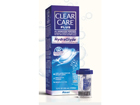
|
NEW YORK—The National Advertising Division of the Advertising Self-Regulatory Council late last week recommended that Alcon Laboratories discontinue certain claims in advertising for Clear Care and Clear Care Plus contact lens solutions.
The issue in question at NAD revolved around whether the preservative-free Clear Care and Clear Care Plus solutions are “more like natural tears,” according to an NAD statement. The claims were challenged by Bausch + Lomb.
NAD is an investigative unit of the advertising industry’s system of self-regulation and is administered by the Council of Better Business Bureaus, according to the announcement. Both Alcon and Bausch + Lomb sell lens-care solutions.
In a statement sent to VMail, Alcon said it will comply with NAD’s recommendations. “Alcon appreciates NAD’s recognition that hydrogen peroxide-based lens care solutions provide many benefits to contact-lens wearing consumers, especially those with sensitive eyes,” the Alcon statement noted.
In addition, Alcon said it’s “pleased” that NAD recognized the following:
·Its product comparison chart appropriately highlights differences between hydrogen-peroxide solutions and multi-purpose solutions.
· Alcon may properly compare the differing features, ingredients and mechanism of action between its hydrogen peroxide solutions and multi-purpose solutions, including highlighting that its products clean and disinfect in a way that multi-purpose solutions cannot.
· Alcon’s Clear Care Plus hydrogen-peroxide based solution provides the same cleaning and disinfection efficacy as its original Clear Care solution, with added wettability and moisturization benefits.
·The saline solution remaining after neutralization with a hydrogen peroxide solution, like one’s own tears, does not contain preservatives which can irritate eyes.
Finally, Alcon said it is “disappointed that NAD did not recognize the widely-accepted fact that as a class, hydrogen peroxide solutions provide better disinfection than do multi-purpose solutions and that NAD found that the 913 Study, as corroborated by the Lievens Study, did not support broad superior comfort claims versus multi-purpose solutions.”
In its announcement, NAD also noted that Alcon had, at the outset of the hearing, already moved to “permanently discontinue the claim ‘More Like Natural Tears than Biotrue,’ which had been featured on a shelf-talker before the NAD’s initial inquiry.”